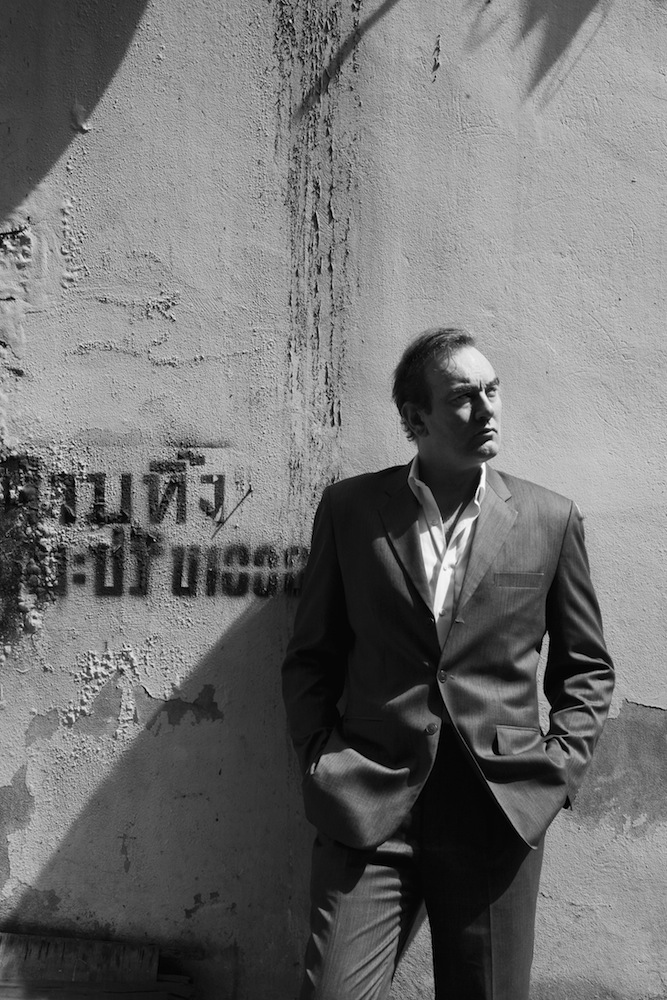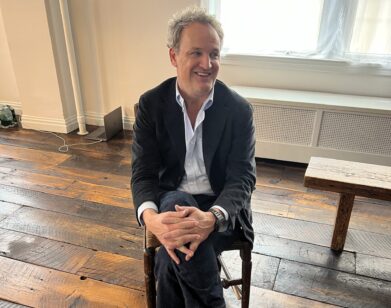Lawrence Osborne

ABOVE: LAWRENCE OSBORNE
Once, when I was feeling disenchanted with contemporary fiction and complaining that no one ever writes great books set in exciting foreign locales anymore, a friend suggested Lawrence Osborne. I can’t remember who that friend is, but I owe her tremendous thanks. I dove headfirst into Osborne’s 2012 Moroccan novel The Forgiven and was blown away not only by the jarring, mysterious story of careless Western vacationers caught in circumstances from which that they can’t buy or talk their way free, but also by Osborne’s wizardry with descriptions. He is almost unrivaled among living novelists in his ability to reanimate weather and nature-transforming sunsets, deserts, parties, and even the hands of locals into rare and ferocious marvels. Osborne’s novels are full atmospheres, they continue to engulf as you read, and the worlds he creates never feel like creaking painted backdrops rolled out to separate scenes. He’s often compared to Graham Greene, but I find him holding his own with Patricia Highsmith—the morality of his books are more ominous and shifting.
His latest novel, Hunters in the Dark (Hogarth), which arrived in the U.S. earlier this year, concerns a young British traveler who journeys over the boarder from Thailand into Cambodia. Flush with a win at a casino, Robert Grieve quickly falls into the passing hands of a wily American ex-pat, corrupt police officers, a beautiful young Cambodian student, and an opportunity to strip himself of his own past. It isn’t so much a simple game of cat-and-mouse, as a ruthless and gorgeous chessboard. The dark history and deep humidity of Cambodia practically warps the pages.
Osborne lives and works in Bangkok, so our interview was conducted by email. I forgot to ask him a question about this haunting line in Hunters in the Dark, so I will simply close on quoting it: “It was not nothingness that instilled fear in him, it was the morbid idea that life had meaning after all.”
CHRISTOPHER BOLLEN: How is living in Bangkok? I once spent a day there a few years back on my way home from Koh Yao Noi and loved what little I got to see. I could tell I hadn’t even scratched the surface. Why did you choose it as your home base?
LAWRENCE OSBORNE: It’s a long story, but I’d lived here at different times of my life before moving here in 2012. I left New York after my mother died and, rather aimlessly, had settled in Istanbul for a change of scene. It was a rather dramatic gesture on my part since I’d lived in New York for 20 years, but I felt I needed something different—the escalating expense and pressure of New York had begun to weary me. Istanbul was marvelous, but I could sense what was coming with [Turkish President] Erdogan and the situation in Syria, and my instinct was “No thanks.” So I came back to Bangkok. I spoke the language; I had friends here already. In fact, it turns out to be the perfect city for a writer. You can be alone without being alone, you can rejoin the middle class economically and cease living like a desperate student. And you can wander the world’s most interesting urban labyrinth at night. I could mention other delights—the guavas, the daily swim, and the heat, for example—but they are self-explanatory.
BOLLEN: You are one of the few contemporary writers who truly evoke the feelings—plural—of travel. How does the setting for a book come to you? Do you choose your location first, say Cambodia or Morocco, and let the story grow out of that? Or do they arrive together?
OSBORNE: To me, the contemporary novel suffers from a lack of sense of place, or spirit of place, if you will. It’s not important to most writers, I must assume, or they try to research a given background on sabbatical. Not for me. I write about places I’ve lived long before I ever set pen to paper. This doesn’t mean I’d continue setting stories in far-flung places—but rather that I am drawn firstly to places. I think character grows out of place, not the other way around. Morocco and Cambodia were both places I’d loved rather aimlessly, and the stories that eventually suggested themselves grew organically out of that experience. Neither story would work if set in Clapham Junction.
BOLLEN: In terms of place, you have a magnificent ability to describe weather and nature. And that is largely another missing element in contemporary novels—maybe there are too many set in western cities and suburbs to allow for it. But the environments you describe, particularly in Hunters in the Dark, have this urgency and awesome power like jungles reclaiming land. The “backgrounds” really take over at moments and become foreground. You don’t follow that usual formula of, “Okay, I have sufficiently described the house, now I can stop and spend the rest of the novel on the characters who live in it.” When do you feel you’ve set a scene perfectly?
OSBORNE: For me, place is everything. The atmosphere and spirit of place. I think I spend more time thinking about that than anything. The subtle intuition of nature is something that all people possess and are alive to, but it’s lost in urban environments and, therefore, in urban novels. One of the reasons I like living in Bangkok is that, although it’s a megacity, it’s very saturated with nature—the vast and brooding skies, the sudden storms and rains, the vegetation and even the animals that abound. In the novel, this raises for me philosophical questions about how human beings exist via their consciousness. What does that consciousness consist of, if not what D.H. Lawrence called the “spirit of place”? How does that determine their behavior?
BOLLEN: In Hunters in the Dark, you have two western men at the heart of the novel that function as protagonist and antagonist. There’s Robert, the erstwhile teacher from Britain, and there’s Simon, the nefarious American. I’m curious why you chose for Simon to be an American. Americans are such notorious travelers in terms of their global reputation, and maybe they do move differently through the world. Do you think that’s true?
OSBORNE: Yes. There’s a distinct unease about Americans when they are outside the United States. I can’t say quite what it is, but they are easily spooked or driven to cynicism—the country is diverse, but paradoxically extremely insular. In Asia, though, you do meet these very sophisticated, supple Americans. It’s as Baudelaire said 150 years ago, to the effect that no one is more sophisticated than a sophisticated American. But there’s always a strange whiff of hysteria and decay. Europeans seem quite childish and innocent by comparison. I know this is the reverse of our usual clichés.
BOLLEN: Hunters in the Dark is described as a thriller and certainly there are thriller-like qualities to it. I’m of the belief that plot gets short shrift in literature, and your plots really do have that puzzle-quality of a mystery. How do you find the balance between literary writing and the engine of a plot?
OSBORNE: The term “plot” is a tinny one, because in reality the tale, the story—whatever word you want to use—is the core of a novel’s meaning, whatever post-modernists try to argue. The novel is not an essay; it is not the cult of the sentence. Beautiful sentences are the easiest thing a novelist can pull out of his little hat, which is why novelists do that far more than they construct their narratives with moral intention. The latter is far more difficult, and far rarer. It’s true that there is a tension between plot and sentence cultism, and the two mix uneasily. Stendhal said that the ideal language of the novel was the Code Civil. There is a reason for that—to make a narrative gripping a writer has to deliberately let attention stray from his beautiful sentences. It doesn’t work otherwise. Yes, it works in Lolita, to a point—but only because it’s the one book where Nabokov allowed his pathology to meet his verbal virtuosity halfway. Mostly, we get “baggy monsters” of raging prose that don’t have any elegant enigma to them. My great model for the way a story can be told comes from Japanese cinema: Kobayashi’s Hara-Kiri. It’s the perfectly told story—chilling, austere, superbly crafted down to the last detail, suffused with pitch-perfect atmosphere. And, because it’s the tale of an impoverished samurai who asks to commit suicide in a powerful samurai house because he wants to earn a few pennies to feed his family, it carries a moving moral weight that eventually becomes all-consuming for the viewer. Of course, the Japanese are masters of this spare storytelling, and I am not. But one has to have one’s inspirations! In the end, it’s a question of intensity. Is the plot-weak novel actually intense in any way? Generally, it is not.
BOLLEN: You just mentioned “narratives of moral intention.” What do you mean exactly by “moral”? Is there a moral order that you strive for in your fiction?
OSBORNE: Yes, I think the story itself should have that dimension rather than being an endless digression or a whimsical wandering around the cultural block. I don’t mean that it should preach or be moralistic, of course. On the contrary, the story is pure delight and, in its workings, free of obvious intentions. The reader should never feel that he or she is being shepherded into a political position of some kind. What you are giving him, after all, is just your own vision, which he can take or leave—but it should have a shape, a momentum.
BOLLEN: The Khmer Rouge had a very dark moral order—if you can call complete blind allegiance a moral order—and the massacres of the Khmer Rouge haunt Hunters in the Dark. But it isn’t only the Khmer Rouge. There’s also the question of American and European involvement in the East. Can a westerner ever really understand these “exotic” places? Have we done irreparable damage? Is there a deep disconnection culturally between East and West to this day?
OSBORNE: It’s interesting that, unlike the Middle East, there is no antagonism or hostility between the West and places like Vietnam or Cambodia. In Cambodia, you get the sense that forgiveness and moving on are more important to them. These are not cultures that blame outsiders for their problems. They do not forget that there are other, closer enemies with more lethal intentions. The Vietnamese today are consumed by anxiety about the Chinese, their ancestral foe, not about the Americans who fought on their territory half a century ago. Thailand, which housed and houses the largest CIA operation in the world, was always a willing American ally, though that has soured of late as it pivots towards China. As for understanding, I’ve come to understand that understanding is largely non-understanding and perhaps it’s beside the point. The great civilizations of Asia are like whirlpools sucking you in, and hence the only attitude that gets you anywhere is gentle surrender. Instinctively, the Western mind resists and stiffens. Bangkok, to give an example, is full of enraged, baffled white men who are nevertheless seduced enough to linger on. They are constantly moralizing and haranguing the Thais, but it does them little good. Yet the West has contributed enormously to these cultures too, and few educated Asians would want to deny that. On the contrary, I think East and West are drawing closer, converging in unpredictable ways. In the great Asian cities this process is well underway and is fascinating. It’s perhaps here that the most dynamic urban civilization of this current century will take place.
BOLLEN: In your novels, you’ve mastered that collision of East and West. The disease of the wandering westerner might be a certain lost individuality, a freedom with no center. Many of your Cambodian characters, on the other hand believe in signs and portents and dreams and reincarnation. But it strikes me that in Hunters in the Dark, everyone East and West is really doing whatever they can to get by—even if that includes theft or murder or prostitution. Everyone seems on the dangerous edge and scrambling to stay afloat. Maybe that’s what they share. This might be the morality question again, but is there any room for a moral gesture in such a haunted place?
OSBORNE: Cambodia, for the time being, is in part that kind of place. But it is far from being the most bleakly desperate in terms of the struggle for survival. Nevertheless, the two populations—Khmer and foreigners—very often converge as their struggles for survival intertwine. Here, a moral gesture can seem very strange to us: Sothea kills Davuth in his hotel room in order to avenge her dead lover, Simon. Is it a moral gesture? In its way, yes. In her eyes it is. The person who exacts revenge feels it as a moral act, which brings the world back into equilibrium. A judge sees that differently, but a judge is not the arbiter of our private reality. As Buddha says, “Look to your own salvation.”
BOLLEN: You have often been compared to Graham Greene. As a big fan of Graham Greene, I’d love to hear how you feel about that comparison. Something about The Forgiven, for example, actually reminded me more of Patricia Highsmith’s Tremor of Forgery—maybe just because of the death of a local. Do these authors influence your work? Do you see yourself writing in a certain genre or history of fiction? Or are these associations annoying and nonsensical to you?
OSBORNE: The Graham Greene meme with me has nothing to do with my own utterances. I’ve never made such a comparison or even suggested it. Of course, Greene is inevitable; he’s in the blood, so to speak. His greatest books are the short, first-person novels he began to write in his fifties—The Quiet American, The End of the Affair, etc.—which have an unbearable sense of crisis and sadness that makes them very beautiful. I was also Catholic growing up, but I’ve been asked about that, so I suppose the Greene comparison is mostly about non-western settings. Those settings have grown naturally out of places where I’ve actually lived. In the end, it’s American writers like Patricia Highsmith—as you say—and Paul Bowles who have most influenced me. There’s a strange, menacing cool about them that American prose has totally lost since. They were expatriates and they had the sense of exile and cunning that I feel close to. Their novels reflect this, as they were bound to. As for Thailand, I will get round to a novel based here. I wanted to live here at least four years before attempting it, because it’s a complex and extremely strange place and I wanted to master the language first. I think it hasn’t yet appeared in the pages of fiction, if we except the work of John Burdett, Christopher Moore. and Jake Needham, not to mention a slew of hard-boiled writers.
BOLLEN: Okay, here’s a 101 question. How far into the actual writing does the story congeal? Do you know from the outset where it will end, or are you watching these collisions of characters and letting the actions play out?
OSBORNE: I start with characters and a premise, but I never know what will happen. Since the plot of Hunters turned out to be so intricate and close-fitting, I was suspected by some of having contrived an artificial machinery that was too pat. However, I didn’t plan any of it. It’s like a chess game you play with your own unconscious. Bit by bit the pieces fall into a pattern. The pattern is not at all arbitrary, as the word “unconscious” might otherwise suggest. It is woven out of the inner logic of the characters as they interact.
BOLLEN: We’ve talked about your attention to weather and nature, but you are also a keen observer of clothing. Shoes begin and end Hunters in the Dark. Shirts and tailoring come into play. Does clothing particularly interest you? I don’t know if this is connected, but in The Forgiven, you prove yourself a great describer of parties.
OSBORNE: I personally find parties fascinatingly nightmarish. I detest going to them, but once there I find they are like small social experiments. The conversations are highly theatrical and over-sexualized, but curiously revealing. We are on display at parties, exposed without knowing it. Think of the fantastic parties scenes in Fellini and Antonioni—I am much inspired by those. Think of L’Avventura or The Eclipse or La Dolce Vita. The party is a point of crisis in the lives of the bored and rich.
BOLLEN: Finally, I’d love to hear about your writing routine. Are you disciplined down to the time of the day?
OSBORNE: Since I live in a tropical climate, I work when the light has faded out—late at night is best for me. The koel birds are wailing, the cicadas and frogs keep me company, and the phone has stopped tormenting me with temptations. I start at about 10 pm and work through till 4 am with pots of incredibly expensive Chinese tea.
HUNTERS IN THE DARK IS OUT NOW.






